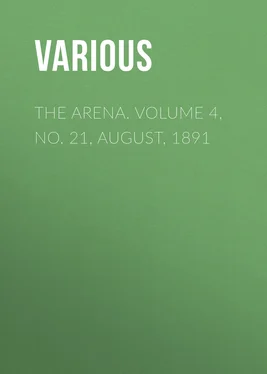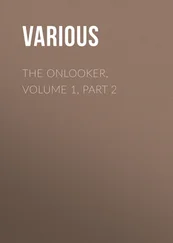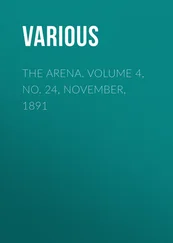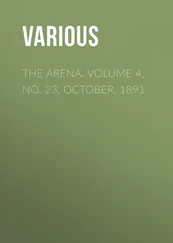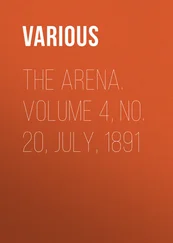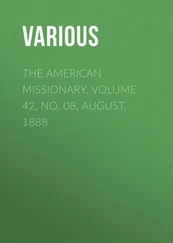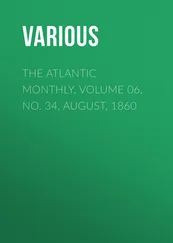Various - The Arena. Volume 4, No. 21, August, 1891
Здесь есть возможность читать онлайн «Various - The Arena. Volume 4, No. 21, August, 1891» — ознакомительный отрывок электронной книги совершенно бесплатно, а после прочтения отрывка купить полную версию. В некоторых случаях можно слушать аудио, скачать через торрент в формате fb2 и присутствует краткое содержание. Жанр: foreign_antique, periodic, foreign_edu, на английском языке. Описание произведения, (предисловие) а так же отзывы посетителей доступны на портале библиотеки ЛибКат.
- Название:The Arena. Volume 4, No. 21, August, 1891
- Автор:
- Жанр:
- Год:неизвестен
- ISBN:нет данных
- Рейтинг книги:4 / 5. Голосов: 1
-
Избранное:Добавить в избранное
- Отзывы:
-
Ваша оценка:
- 80
- 1
- 2
- 3
- 4
- 5
The Arena. Volume 4, No. 21, August, 1891: краткое содержание, описание и аннотация
Предлагаем к чтению аннотацию, описание, краткое содержание или предисловие (зависит от того, что написал сам автор книги «The Arena. Volume 4, No. 21, August, 1891»). Если вы не нашли необходимую информацию о книге — напишите в комментариях, мы постараемся отыскать её.
The Arena. Volume 4, No. 21, August, 1891 — читать онлайн ознакомительный отрывок
Ниже представлен текст книги, разбитый по страницам. Система сохранения места последней прочитанной страницы, позволяет с удобством читать онлайн бесплатно книгу «The Arena. Volume 4, No. 21, August, 1891», без необходимости каждый раз заново искать на чём Вы остановились. Поставьте закладку, и сможете в любой момент перейти на страницу, на которой закончили чтение.
Интервал:
Закладка:
Luther is the one predominant Teuton of the centuries, after the close of the middle ages, and though he ceases to be present in the flesh in 1516, he never dies. The inspiration of the German soul endures and lives in every variety of art or expression. Luther is perpetuated in Handel, and technically, even his “ Feste Burg ” is the first note of the “ Inspirate ” in “ I Know That My Redeemer Liveth! ”
It is only the most inattentive of historical students who can afford to ignore this. No modern æsthetician from the Rhine to the Spree affects to dispute the succession of Teutonic thought, in its various forms of passion, from Beethoven to Goethe, from Schiller, Jean Paul, or Weber, or Ravner, or Kleist, or Immermann, down to the latest high priest of the pre-historic cult—down to Richard Wagner himself! It was precisely this that the Emperor Frederick knew as crown prince, and that the chancellor had to learn. With the crown prince all was present. The farthest past was with him; the leaves of the uralte forests had whispered their dream lore in his ears as in those of the Siegfried of the Niebelungen; he had seen Otto von Wittelsbach strike dead his very Kaiser for breach of faith 6 6 The heroic founder of the Bavarian monarchy, Otho of Writtelsbach, was betrayed shamefully by his friend, the Emperor Philip, of Suabia, and slew him for his treachery. This is one of the oldest dramas on the German stage.
and stood by at the Donnersberg, when mighty Rudolph’s son slew Adolf of Napan for his base attempt at usurpation. He knew it all, legend or chronicle; no secret was hidden from him, and the national pulse beat in him with fiery throb from the first hour when the national conscience had been touched. The chancellor was chilled by his own statecraft, and the king, as he then was, had witnessed the Napoleonic wars.
Between the crown prince and Bismarck, however, there existed one point of contact. Each was a Deutsche Student , and there, later on, was to be found the true conversion of the chancellor to national ideas.
As in every genuine lover of his country (and that Prince Bismarck is), there lay latent in the famous “White Cuirassier” the same ideal capacity of warlike action and intellectuality that so distinguished Frederick II. No one understood better the complex son of Carlyle’s roystering barrack hero, no one knew in reality more deeply that the ideas planted by him in men’s minds were those of the majesty of intelligence, of the royalty of humanity’s brain power.
Count Bismarck proved his political foresight by the rapidity with which he seized on the Schleswig-Holstein question as being the axis on which turned the entire evolution (if ever it should be possible!) of the imperial German unity. About that he hesitated not one moment. He adopted the whole theory of Dahlmann, who alone spoke it out in words in 1848-9, but he feared to plunge at one leap into the vortex of his own threatening conclusions and tried for several years to stave off the “pay day.” He was somewhat slower to recognize the identity of feeling through all the Germanic races, to realize the equally strong vibration, the psychologic harmony quivering through heart and soul from North to South, through the mysteriously hidden dramas of fifteen hundred years. He believed himself a narrow Particularist Borussian, a “Pomeranian Giant,” and let a score of years go by before clearly making out by touch that the strange change of tonality, of sound, and significance that superposed the patriotism of the South to that of the North was a mere inharmonic change, and that according to the rotation of the two circles, each, in reality, underlay the other in turn.
It would be a fatal mistake to imagine that M. von Bismarck allowed himself to be led into the Danish campaign. He did nothing to bring it about, but the instant it showed itself on the cards he took advantage of it in the most predetermined, authoritative way, leaving his Austrian accomplice and victim no possibility of escape. From the hour when, in 1853, he boarded Count Richberg on the Carlsbad Railroad, and forced his enemy of the Francfort Bund to become his humble servant and carry out all his designs, to the hour when, in 1865, he drove Franz Joseph to sign the Condiminium on what he knew was a mere waste paper, he was resolved to turn to account the extraordinary opportunity offered him by the incredible blindness and insensate terror of revolution of his allies. In the Austrians, the dread of what the smaller States, encouraged by Hungary, might attempt, paralyzed every other consideration, and besides that, the abortive little plans of Count Beust, in Saxony, served to point out to him what other Germans were, in a purely German sense, thinking of, and he decided that the grand historic game thrust upon his perceptions and waited for by all around him, should be played by himself alone. Then he played it, not before seeing at once what it must entail, but by no means assured that he could win.
And then, they who watched him nearest and knew him best, know how he played that game, mindful of every event that filled the long history of the past, living over again all the struggles, all the glories and defeats of all the European nations far or near, finding examples both to imitate or avoid, losing sight of nothing, from Gregory VII. to Gutenberg, from papal obscurantism to the Reformation’s blaze of light; from Wallenstein’s murder to the treaty of Utrecht; from Richelieu to the scaffold of Louis XVI., and while calculating every catastrophe, keeping steadily on his way.
This, the fearful period between the Crimean War, when first Cavour stepped forth to the incident of Ems, when the die was cast, this was the really magnificent passage in the great chancellor’s career, for this was the time of possible doubt when responsibility lay so heavy that to elude it might be called prudence, and which to have survived is already a proof of superiority over common humanity.
And here we assert the true grandeur of the precursor,—of the one whom we have called the inventor, and who undeniably was so—of Cavour! There can be no question that his own intimate familiarity with the details of the Bond of Virtue and the War of Freedom 7 7 The celebrated victory of the Great Elector, that made Prussia into a kingdom.
of the glorious epoch when modern Germany headed and achieved the victorious movement against the world’s debasement,—brought distinctly to Bismarck’s mental vision the splendor of Cavour’s impossibly unequal contest for Italian freedom! The situations were essentially much alike, but so much grander for the Italian statesman, Italy’s odds being so immeasurably longer! But still the likeness came out, and the future chancellor could in no way aspire to be an initiator. The end was still a gigantic one, and one to which no true, brave patriot dared be false as an ideal,—but how as to the execution? As to the practical means of carrying out conceptions that might daily be doomed to alteration?
There it was again that the figure of Cavour arose supreme; his long, inexhaustible patience, his undying hopes, his sacrifices day by day of the very springs of life for a self-imposed duty,—these were his titles to immortal fame, these constituted his sovereign right to success. But was not the worst probation over when Waterloo was won, and was it not an accepted theory that the Vienna Congress had settled all the vexed questions of ancient Europe? Any further movement, therefore, might seem merely a disturbance. This, for conservative statesmen above all, was a dilemma.
Germany had liberated not Germany only, but the world in 1813, and had already had her Cavours!
There was no denying it: the Cavour of Germany was Stein. But was the work done? Had the Congress of Vienna settled anything, for was that still left to do without which the independence and well-being of forty millions of Germans was unguaranteed, and the peace of all Europe uninsured? If so, what remained to be achieved? to complete what the German Cavour, the Precursor Stein, had begun, to embody and make real the glorious dreams of which Queen Louise had been the symbol, the Joan of Arc? 8 8 I would recommend every student of history to read attentively the extraordinary article of M. Paleologue in the Revue des Deux Mondes entitled “ La Reine Louise de Prusse Comment se Fait une Legende .” It is a poetic but true suite to Professor Lévy Brühl’s magnificent study.
Интервал:
Закладка:
Похожие книги на «The Arena. Volume 4, No. 21, August, 1891»
Представляем Вашему вниманию похожие книги на «The Arena. Volume 4, No. 21, August, 1891» списком для выбора. Мы отобрали схожую по названию и смыслу литературу в надежде предоставить читателям больше вариантов отыскать новые, интересные, ещё непрочитанные произведения.
Обсуждение, отзывы о книге «The Arena. Volume 4, No. 21, August, 1891» и просто собственные мнения читателей. Оставьте ваши комментарии, напишите, что Вы думаете о произведении, его смысле или главных героях. Укажите что конкретно понравилось, а что нет, и почему Вы так считаете.
